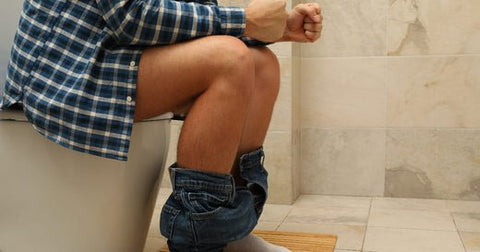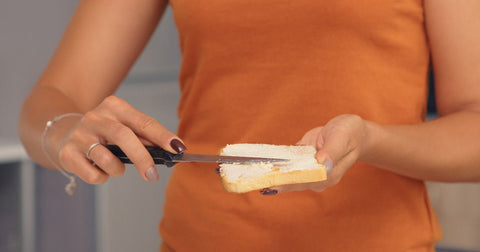Do you struggle with constipation?
Constipation is a pretty common digestive issue affecting millions of people. It can be uncomfortable, frustrating, and disrupt daily life. Let’s be honest, with the amount of stress we all deal with on a daily basis, it's no surprise we’re all struggling with constipation and that quick fixes like the "7 second poop trick" have gained popularity on platforms like TikTok. Let’s look and see if this trend really offers immediate constipation relief at home.

What is the "7 Second Poop Trick"?
The seven second poop trick is a social media trend that claims holding your breath and straining for seven seconds during bowel movements can immediately relieve your constipation. Although this sounds quick and easy, there's no scientific evidence to support this claim.
Why the "7 Second Poop Trick" Might Not Work
Straining during bowel movements can actually worsen your constipation. It puts even more pressure on your pelvic floor muscles, potentially leading to hemorrhoids or weakening the muscles that control bowel movements. Also, holding your breath can briefly increase abdominal pressure and might be a quick fix, it's not a sustainable or effective way to promote regular bowel function.

Understanding the Causes of Constipation
There are several underlying factors that can contribute to constipation and bloating. Here are some common causes:
1. Diet: Lack of fiber, dehydration, and excessive intake of processed foods can all slow down digestion.
2. Food Intolerance: Constipation can be triggered by food intolerance. When your body has difficulty digesting certain foods, it can lead to sluggish bowels and constipation. Do I have food intolerance?
- For example, if you have lactose intolerance, eliminating or reducing dairy products may improve your constipation.
- If you are sensitive to gluten, following a gluten-free diet can help alleviate constipation and other digestive issues. Am I gluten intolerant?
3. Dehydrated: Drinking plenty of water throughout the day keeps your digestive system moving smoothly. Dehydration can harden stool and make it more difficult to pass. Aim for eight glasses of water per day, adjusting based on your activity level and climate.
4. Lack of Exercise: Regular physical activity helps stimulate the digestive system.
5. Medications: Certain medications can cause constipation as a side effect.
6. Medical Conditions: Underlying medical conditions like irritable bowel syndrome (IBS) can also contribute to constipation and bloating.
Safe Ways for Immediate Constipation Relief at Home
Here are some strategies to help manage and prevent constipation:
- Increase Fiber Intake: Aim for 25-35 grams of fiber daily from fruits, vegetables, and whole grains.
- Focus on Soluble and Insoluble Fiber: Both types of fiber play a role in promoting regular bowel movements. Soluble fiber absorbs water and forms a gel-like substance in your intestines, softening stool and making it easier to pass. Insoluble fiber adds bulk to your stool, helping it move through your digestive system more quickly.
- Gradual Increase: A sudden increase in fiber intake can cause bloating and gas. Gradually increase your fiber intake over a few weeks to allow your gut bacteria to adjust.
- Fiber-Rich Food Options:

- Fruits: Berries, apples, pears, oranges (with pulp)
- Vegetables: Leafy greens (spinach, kale), Brussels sprouts, broccoli, sweet potatoes
- Whole Grains: Oatmeal, brown rice, quinoa, whole-wheat bread and pasta
- Legumes: Beans, lentils, chickpeas
-
-
- Nuts and Seeds: Flaxseeds, chia seeds, almonds
-
- Learn what you can eat: Take control of your digestion and find out exactly what foods you might be intolerant of with our food intolerance test kit.
- Stay Hydrated: Drinking plenty of water throughout the day keeps your digestive system moving smoothly.
- Regular Exercise: Engage in moderate physical activity most days of the week.
- Establish a Bathroom Routine: Try to use the restroom at a similar time each day, even if you don't feel an urge.
- Probiotics: Consider incorporating probiotic supplements or yogurt with live cultures to support gut health.
When to See a Doctor
Although it might seem like a quick fix, we don’t recommend trying the “7 second poop trick”. There are ways to manage your digestion but if you experience chronic constipation and bloating, frequent straining, or blood in your stools, it's crucial to consult a doctor to rule out any underlying medical conditions.
Remember: There's no quick fix for constipation. Try changing how and what you eat and adopting healthy lifestyle habits. It's important to address the root cause. Learn what you can do to manage your digestion here.
Disclaimer: The information provided in this article is for educational purposes only and should not be construed as medical advice. Always consult with a healthcare professional before making any changes to your diet, exercise routine, or starting new supplements.



.png?v=1737390083)
.png?v=1737187409)


